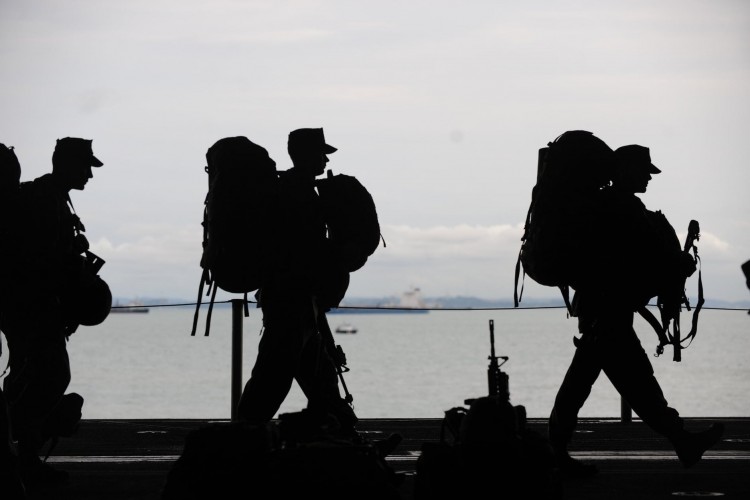World War One
"We are dead. Short days ago, we lived, felt the dawn, saw sunset glow". These few words are enough to sense the dismal climate that was perpetuated by World War One. The lines extracted from 'In Flanders Field' were penned by Canadian poet John McCrae. McCrae served as a voluntary military physician in the Second Battle of Ypres at the Belgium frontlines on April 22, 1915. In the poem, McCrae subtly bemoans the profound loss he witnessed during the battle.
The battle is infamous for Germany's use of toxic chemical weapons on a large scale. The poem's characteristic grim description of the soldiers' deaths in the Great War truly emulates the ruthless spirit of World War One. The poem's symbolic gesture of 'red poppy' is used as a symbol of remembrance of the horrors and irrevocable losses of the war.
The Great War claimed roughly 20 to 40 million lives. Out of the cumulated figures, 6.6 million includes civilians who died of diseases, starvation, or other spillover effects of the war. Ten million deaths comprise of soldiers and other military personnel. Many were rendered physically impaired, some who went missing were presumed dead, and others were severely wounded and eventually succumbed to their injuries. The reason that today's historians' have can only estimate the number of casualties is because of the rapid speed with which the battles took place. World War One incurred a devastating blow that halted the progress of civilization.
Countries participating in the war attempted to change their local culture by fueling patriotism. While they succeeded with most civilians, some still protested against the unreasonable logic behind the atrocious events that took place over the four years. World War One, starting on July 28, 1914, and finally coming to an end on November 11, 1918, is an important event in our history. Students, in particular, should know about the war because it's a common essay topic in history class. But, if you don't know how to write about the Great War, don't worry! Several essay samples on World War One can be found online on websites such as StudyDriver.

Causes of World War One
World War One was foreseen by many, given the growing hostility between the Triple Alliance and the Triple Entente. The Triple Entente was an informal peaceful conciliation among Russia, the French Republic, and Great Britain. It started in the early 18th century with diplomatic and covert meetings but consolidated its presence in 1904. The Triple Alliance, on the other hand, consisted of Germany, Austria-Hungary, and the Ottoman Empire who had a dominating influence in Europe. Italy was also a participating ally of the Triple Alliance but joined Britain in 1915. Before the formation of such allied forces, one of the critical elements that laid the foundations of the Great War was the expanding nationalism concentrated mainly in Europe.
Many historians also posit that the motive behind the events of the 1870's Franco-Prussian war instigated the belligerence between France from the Triple Entente and Germany from the later Triple Alliance. Franco-Prussian war's prime intention was the unification of Germany, which was successfully achieved with the defeat of the French Republic. The establishment of the German empire indicated the burgeoning empire of their militia and industries. This led to an armistice race between Germany and Britain from the 1870's up to the beginning of World War One. The race exceeded to imperialistic greed as the countries apprehended threats from each other. As Germany and Great Britain established their naval bases and militia, a large scale war was foreseen by many in the sense that now battles will be fought overseas as well. The Great War was now not just a frenzy but a tangible reality.
However, one major event that formally initiated World War One was the assassinated of Archduke Franz Ferdinand, presumed heir to Austria-Hungarian reign, and his wife on June 28, 1914, in Sarajevo. Gavrilo Princip executed the assassination at the mere age of 19! He was also a member of Serbia's Black Hand society and Bosnia's Young Bosnia. Austria-Hungary, on July 28, 1914, declared war against Serbia. The war then included Germany, who had a secret alliance with Austria-Hungary to protect themselves against Russia.
U.S. President Woodrow Wilson initially maintained neutrality in World War One, but then Germany sank many American merchant ships that, according to Germany, crossed the war administered borders. The incident infuriated President Wilson, who pledged alliance to the Triple Entente in 1917. Luckily, we now have color photographs of some incidents of the First World War that you can show your history class! You can enter this link to see them.
End of the War
On November 11, 1918, Germany surrendered, and people rejoiced the end of the war. The day is celebrated as Armistice Day every year. The Treaty of Versailles popularly marks the end of the war. The treaty, which was signed on June 28, 1919, blamed the war on Germany. The settlement is regarded as controversial because it partially indicted Germany as a war criminal to appease the allied powers of Triple Entente, along with Japan and the U.S. The other allies from the Triple Alliance signed separate treaties. The number of casualties' resulting from the World War make it one of the worst tragedies in humankind's history.
Post War
World War One is a historical debacle that caused insurmountable destruction on a global level. It bombarded vital infrastructure, caused the deaths of 6.6 million civilians, and destroyed the economies of many countries. Economic stability was one of the hardest things to rebuild after the war as governments had frivolously poured their treasures into the wars. In light of the damages procured, Woodrow Wilson, President of the U.S., established the Covenant of League of Nations in 1920. The League of Nation was an intergovernmental organization, built on the tenets of liberalism and peaceful co-operation among nations. However, it was unsuccessful in preventing another war, and disassembled in 1945, when World War One came to an end.
Another consequence of the Great War was the deadly pandemic Spanish flu. Nobody has been able to confirm its origin, but various historians conjecture its spread started from Poland and then reached Western Europe and the U.S. Due to the turmoil and ruin caused by the war, many people, mainly troops and civilians, immigrated as refugees towards the Western Europe region. It is believed that many of them carried the mutated gene for Spanish flu. The flu affected 500 million people and caused the deaths of 20 to 50 million people from 1918 to 1919. Historians estimate that almost a third half of Europe's population was lost as a result of this epidemic.
World War One also signaled the fall of the Ottoman Empire, which eventually dissolved in 1921.
The tragedies of World War One and its losses are a tragedy, but it lies in the virtue of human nature to remember the events that jeopardized humans' survival lest they are repeated.











Author
Homesgofast com
Homesgofast.com is an international real estate portal and news source for Google news. Publishing international real estate, finance, homes and travel-related news and blogs for a targeted audience since 2002. Each news item is circulated to thousands of potential readers each day and is also available to the millions of people who sign up for Google news alerts. Find homes offered for sale and to rent direct from owners and some of the best real estate agents from over 35 countries